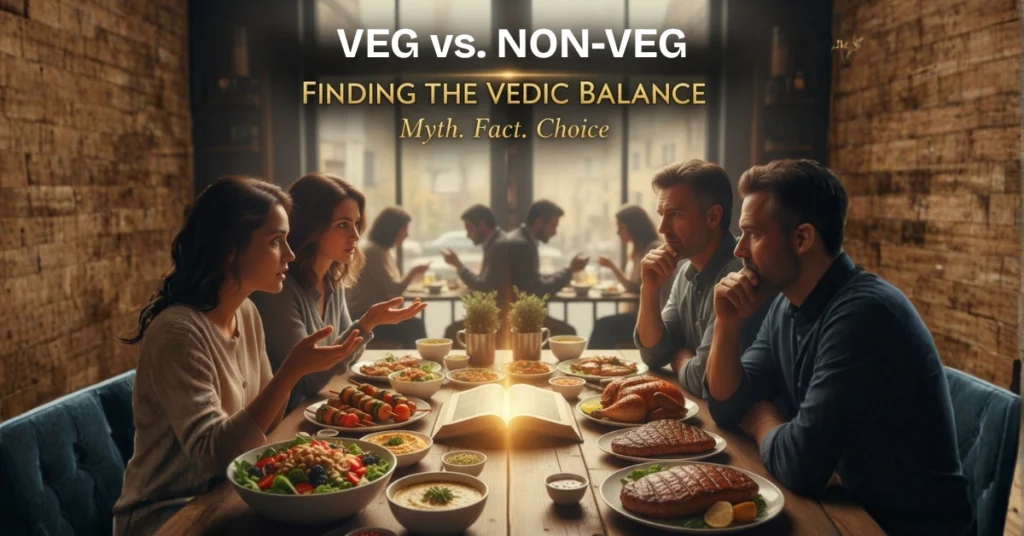Diet is one of the most debated topics in modern society, especially when it comes to the question of vegetarian versus non-vegetarian food. Many people believe that eating meat is “natural” because it keeps the life cycle of nature in balance. Others argue that the Vedic scriptures support only a vegetarian lifestyle.
The truth, however, lies somewhere in between.
This article breaks down the myths and facts about a non-vegetarian diet, sustainability, and life-cycle balance from a Vedic perspective.
Myth 1: “The Vedas strictly prohibit non-vegetarian food.”
Fact: The Vedas do not forbid meat or fish consumption. In the early Vedic period, meat was present during certain rituals or as part of specific occasions. The texts mention animals such as goats, birds, and fish. However, meat was not encouraged as an everyday lifestyle choice. As Vedic thought evolved—through the Upanishads, Ayurveda, and eventually the Bhagavad Gita—the ideal shifted toward sattvic, vegetarian food for mental clarity and spiritual growth.
Myth 2: “Eating non-veg is necessary to balance the life cycle.”
Fact: In nature, predators maintain ecological balance. But humans are not natural predators in the wild food chain. Humans artificially breed livestock and farm fish on a massive scale. This does not help the ecosystem; instead, it often disrupts it.
The Vedic concept of Rita (cosmic order) says: Nature balances itself without human interference. The human-driven meat industry is not part of this natural cycle. So, while predation is natural among animals, human meat consumption is not essential to ecological balance.
Myth 3: “Non-veg food is tamasic and therefore always negative.”
Fact: Vedic texts categorize food into Sattvic, Rajasic, and Tamasic:
-
Sattvic: pure, light, increases clarity
-
Rajasic: stimulates activity and passion
-
Tamasic: heavy, dull, reduces clarity
Meat is usually classified as tamasic, meaning it may slow down the mind and spiritual growth. But it is not labelled as “sinful.”
The emphasis is on mental and energetic effect, not moral judgment. Ayurveda even prescribes meat medicinally for certain health conditions—showing that Vedic wisdom is flexible, not rigid.
Myth 4: “Vegetarianism is the only ethical diet according to the Vedas.”
Fact: Vedic ethics revolve around ahimsa (non-violence) and karma. Killing an animal for pleasure is discouraged because:
-
It disturbs subtle energy
-
It increases karmic debt
-
It affects mental purity
-
It links the eater to the fear and suffering of the animal
But the Vedas recognize that human needs differ based on place, climate, and body type. Therefore, eating meat is not forbidden, but is considered a choice with consequences—physical, emotional, and karmic.
Myth 5: “If humans stop eating animals, the ecological cycle will break.”
Fact: This is scientifically and spiritually inaccurate. Wild predators control animal populations naturally. Humans, on the other hand:
-
Breed livestock artificially
-
Overfish oceans
-
Destroy habitats
-
Raise billions of animals in unnatural conditions
Stopping or reducing meat consumption does not harm ecological balance. In reality, it helps nature heal, aligning with the Vedic value of ahimsa.

Myth 6: “All fish or meat-eaters have lower spiritual potential.”
Fact: Not true. Spirituality depends on:
-
intention
-
compassion
-
self-awareness
-
discipline
-
inner purity
Many ancient communities—especially in Bengal, Assam, Kashmir, coastal regions—ate fish while practicing deep spirituality. Fish was considered more sattvic than red meat.
The Vedas do not judge a person’s spiritual worth based on diet alone.
Also Read: When Love Hurts: Understanding Karmic Relationship and Soul Contracts
The Vedic Middle Path: Conscious Consumption
The Vedic tradition does not promote extreme views. It promotes consciousness in eating:
-
Eat what your body needs
-
Avoid harm where possible
-
Keep the mind light and clear
-
Honour food as divine
-
Maintain balance between body and soul
Whether vegetarian or non-vegetarian, the emphasis is on mindful eating, moderation, and responsibility.
The Vedas offer a balanced approach to diet—not rigid rules. Yes, meat and fish existed in Vedic culture. No, they were not meant for casual consumption. Yes, nature balances itself with predators. No, human non-veg consumption is not required for ecological stability.
What the Vedas emphasize above all is:
“Food should elevate you, not burden you.” And that choice, ultimately, lies with each individual.



